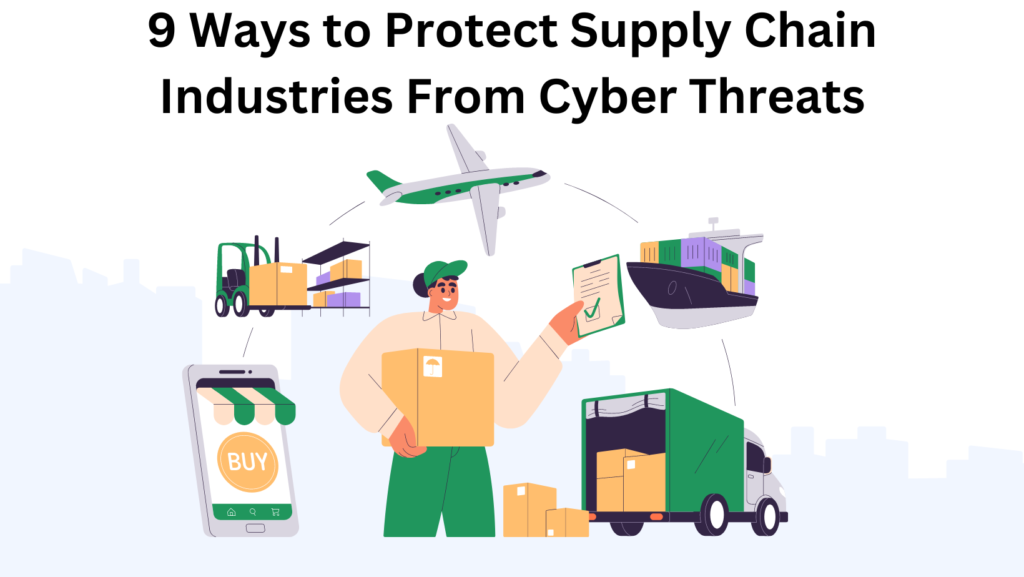
The flow of goods, services, and data in these sectors is orchestrated using digital technology, networks, and data exchanges. The interconnected nature of the supply chain makes it vulnerable to assaults like data breaches, ransomware, and supply chain disruptions.
Cyberattacks can lead to lost revenue, damaged credibility, difficulties running a business, and customer distrust. Supply chain cybersecurity safeguards commercial enterprises and the environment. The ripple effect of a supply chain disturbance can be felt far and wide. Strong cybersecurity measures are essential to protect essential resources, sensitive information, business operations, and supply chains. To safeguard these industries and maintain their resilience, several key steps should be implemented.
How Supply Chain Industries Can Be Protected From Cyber Threats
1. Develop a Robust Cybersecurity Strategy
Cybersecurity in the supply chain necessitates a solid plan. Organizations can mitigate vulnerabilities by adapting their security strategies to their respective industries. This requires a comprehensive risk assessment to identify potential weak spots. It also involves threat intelligence to stay ahead of emerging threats, incident response plans to mitigate cyberattacks, and routine security audits to address vulnerabilities.
Companies in the supply chain need a comprehensive industrial cybersecurity strategy to protect vital assets, maintain operational continuity, and limit the financial and reputational damage caused by cyber-attacks. Having robust cybersecurity measures in place is crucial to safeguarding sensitive data, preserving customer trust, and ensuring the smooth flow of goods and services throughout the supply chain.
2. Educate and Train Employees
Personnel training is needed for supply chain cybersecurity. Despite technological advancements, human error is still the leading cause of cyber intrusions. Regular training on industrial cybersecurity best practices should be provided to employees. This includes password management, awareness of fraud, and software updates. Organizations can reduce the risk of successful cyberattacks and enhance supply chain security by empowering employees to recognize and mitigate cyber threats.
3. Implement Multi-Factor Authentication
Implementing Multi-Factor Authentication (MFA) enhances the login security of supply chain users. MFA safeguards users by necessitating multiple forms of authentication. Typically, this involves a password, a smartphone, a token, or biometric information. Even if an attacker obtains a user’s password, MFA requires a second authentication factor. This eliminates unauthorized access and enhances the security of the supply chain.
4. Secure Network Infrastructure
Companies in the supply chain rely on interconnected networks, making network infrastructure security essential. Robust firewalls filter incoming and outgoing network traffic, preventing unauthorized access and cyber threats.
Additionally, intrusion detection systems monitor network activity and alert administrators of suspicious or malicious behavior. Monitoring network traffic in real time allows for detecting and mitigating security hazards. These procedures protect essential data, sensitive information, and network infrastructure in supply chain companies.
5. Regularly Update and Patch Software

Software patches and revisions reduce the risk of supply chain cyber-attacks. Cybercriminals exploit software vulnerabilities to launch attacks or gain access. Organizations can patch these vulnerabilities and defend themselves from cyberattacks by updating their software.
Update IT solutions, applications, and firmware to implement security patches and resolve bugs. Software should be consistently updated to reduce the attack surface and strengthen supply chain security.
6. Secure Remote Access
In the expanding remote work environment, remote access to supply chain systems is vital. Connecting remote users to the supply chain infrastructure requires using secure VPNs. This protects remote network user data. MFA guarantees that only authorized users can remotely access vital systems. Supply chain industries can use these procedures to safeguard remote work and protect sensitive data and systems from cyber-attacks.
7. Conduct Regular Security Audits
Regular security examinations safeguard the infrastructure of the supply chain. These audits assess network architecture, access controls, data storage, and incident response procedures. Organizations can enhance their security controls by systematically identifying weaknesses and vulnerabilities.
Regular security assessments are required for compliance with industry standards such as the NIST Cybersecurity Framework and ISO 27001. By remaining ahead of security risks and complying, supply chain industries can enhance cybersecurity, reduce threats, and safeguard vital assets and data.
8. Backup and Disaster Recovery Planning
Cybersecurity in the supply chain necessitates backup and disaster recovery planning. Backups safeguard against data loss and cyberattacks. Using a comprehensive backup strategy, organizations can restore data rapidly after a cyberattack or system failure. A complete disaster recovery plan reduces supply chain financial and operational impacts and disruptions. Well-defined protocols, regular testing, and off-site backups help the supply chain industry recover from cyberattacks and prevent losses.
9. Stay Abreast of Emerging Threats
The security of the supply chain requires the surveillance of new threats. Keeping abreast of cyber threats is essential. Professionals can network, share insights, and learn about emergent dangers and best practices at industry-specific forums and conferences.
Cybersecurity news websites provide subscribers with the latest information regarding new attack vectors, malware, data breaches, and security technologies. Staying informed enables supply chain industries to adapt their security measures, implement timely countermeasures, and remain one step ahead of criminals, enhancing their cybersecurity resilience.
Conclusion
Keeping supply chain sectors safe from cyber attacks is essential for the continued success of international trade and commerce. Data breaches, ransomware attacks, and supply chain disruptions are some of the cyber dangers that have emerged due to supply chains’ increasing interconnection and digitization. Implementing industrial cybersecurity, adopting these measures, and promoting a cybersecurity culture can protect supply chain industries from cyberattacks.
FAQs
To what extent are supply chain industries vulnerable to cyberattacks?
Threats such as ransomware, phishing, supply chain disruptions, insider threats, and IP theft exist in companies that rely on a steady flow of goods and services. These threats can disrupt operations, jeopardize vital data, and incur costs.
What are the benefits of implementing encryption in the supply chain?
Encrypting the supply chain has numerous benefits. It safeguards sensitive data against unauthorized access, prevents data breaches, and fosters consumer confidence by demonstrating a commitment to data security.
How can supply chain industries address the risk of insider threats?
To reduce insider threat risk, supply chain businesses should restrict access, limit privileges, monitor user behavior, and promote security knowledge and reporting. Training and surveillance of employees can detect and prevent internal threats.
Is it necessary to have incident response plans for supply chain industries?
There must be incident response strategies in supply channels. These strategies address the detection, response, containment, and recovery of cyber incidents. A validated and documented incident response plan assists in minimizing cyber threats and accelerating response.